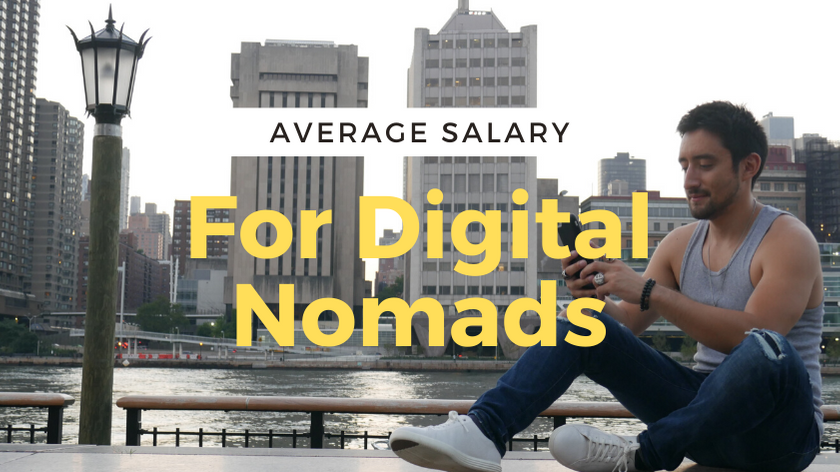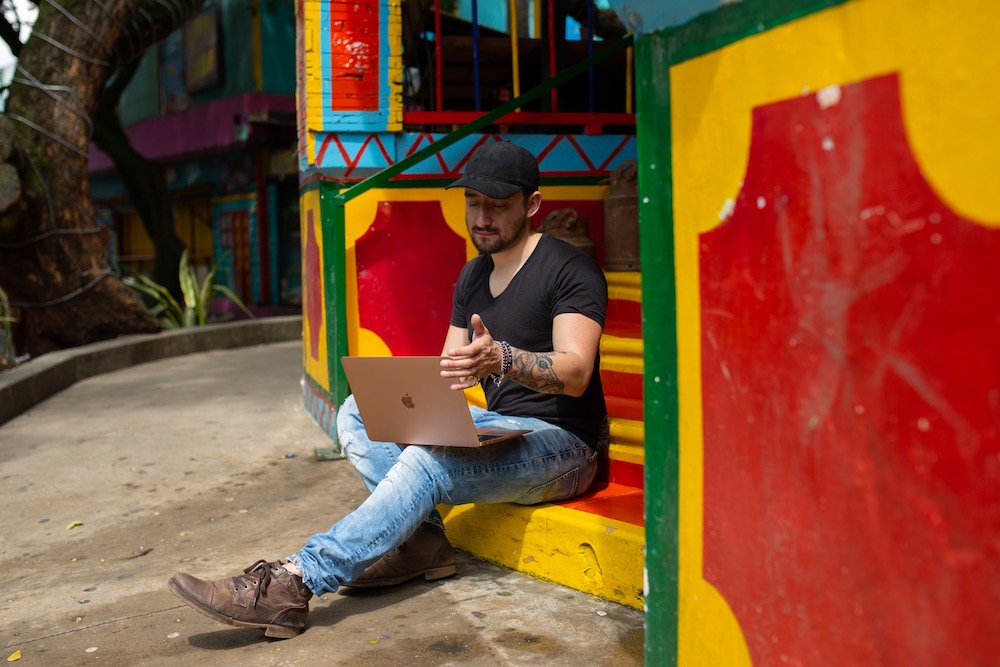How much money do digital nomads make?
Last year, I made $107k from my work as a blogger/podcaster/YouTuber. This comes from a variety of income sources.
The first year that I went full-time, I made $30k, living in New York City as a location-independent entrepreneur. I was 22 years old.
It was so freakin’ scary to be living in a major city and having to depend on the internet as my sole source of income. I was living on egg + cheese sammiches, ramen, and McDonalds.
I remember for my birthday, my girlfriend at the time bought me a cake. This was right around when the first season of House of Cards came out.
Every night, I’d take an hour break from work. I’d lay down on my bed in my tiny $800 apartment in upper Harlem (which I shared with 4 other roommates), and watch House of Cards. I’d eat cake, drink milk, and try to resist the urge to binge watch the entire season.
Believe it or not, I made that cake last a week. Haha. It was my dinner for that entire week.
But, let’s get back to you and the digital nomad statistics that are out there.
If you’re thinking of becoming a digital nomad, then getting an accurate answer to this question is extremely valuable. That’s because, it will help you determine if you should alter your future and your career path.
You’ve heard about these people who earn money from their laptop, travel, take lots of Instagram pics (or vlogs) and manage to make it all work.
You’re wondering, is this lifestyle actually realistic?
I’m going to first cover why the actual answer varies so much, and then drill down into the hard numbers, statistics, and facts so that you can make the best decision possible.
Here’s Why The Answer Varies So Much
The main reason why can be summed up pretty easily… not every digital nomad works full-time.
“Digital nomads are a mix of full-timers (54 percent) and part-timers (46 percent) and many only do it for part of a year.” – MBO Partners.
If someone is not working full-time, then it’s hard to judge their earned income against a person who’s spending 40 hours per week in an office, staring at a computer screen.
In addition, there are standard of living differences which impact how far those dollars earned actually go. For example, let’s say that you’re earning money in US dollars and living in Boston, Massachusetts.
In Boston, MA the average salary is $85,166 and the median salary is $77,54.
This sounds pretty respectable, right? Especially if you’re in your late 20s or early 30s and have a lot of time to save before retirement.
But, remember, you will also be PAYING to live in Boston. In Boston, Massachusetts, the cost of living is 48% higher than the national average.
So, to you, $85k might come out as being the same as the average salary in Austin, Texas, which is $69k.
Why? Because Austin has a lower standard of living cost. Food, rent, and transportation are less costly than in major cities like Boston or New York City.
This means that the spending value of money you earn is directly related to where you’re living.
Earning $85k in a remote town in Idaho might make you feel rich. In New York City, you’re just starting to be able to live a normal life (haha).
So, why does this factor into the full time vs. part time work comparison?
You see, some digital nomads who are living in South East Asia are experiencing an extremely low cost of living as compared to other states, countries, and territories around the world.
For this reason, you can easily get by on a $30k – $50k income, and maybe only work half the time.
In Chang Mai, for example, you can easily get a meal for $3. In NYC, that’s more like $7-8k for a good sub at a deli. You’d be earning in US dollars and spending in Thai Bhat.
Tim Ferriss, who wrote the Four Hour Work Week, refers to this concept as Geoarbitrage. It’s taking advantage of the difference between the cost of living between your home country and your country abroad.
Basically, your money goes farther. For this reason, not every digital nomad wants to break their back earning their old salary. They are content with earning enough to get by, and then spending the rest of the time traveling, or doing fun stuff.
Does that make sense to you?
In addition, certain types of jobs are paid more than others. The average programmer is gonna make more than the average virtual assistant.
It would be a mistake to compare the average digital nomad salary for a programmer with that of a virtual assistant. It’s an apples to orange comparison.
Rather than looking at the “average salary of a digital nomad,” I would recommend looking at the average salary for someone who has the type of career you’d like to pursue.
If you plan to use your writing skills to do freelance writing, blogging, and/or consulting while you are traveling, then look up the average salary for these types of jobs.
Are we on the same page? Good!
Lastly, some digital nomads are business owners. They may pay themselves a big or small salary depending on how they want to allocate their capital.
Maybe they could afford to pay themselves $100k, but instead decide to pay themselves $50k and invest $50k back into the business in terms of ads, freelancers, and tools to make them more efficient at their job.
This investment might initially be considered an expense, but it could lead to future growth, which means even more income down the road.
I know some business owners who don’t even take a salary, because they’re so focused on plowing all profits back into the business to grow it as quickly as possible.
Now, you can see why this question is difficult to answer. But, there is an answer for those of you who love data and straight numbers.
18% of Nomads report making six figures or more
This statistics is put out by Flexjobs. From my travels, my experience is that most of these nomads are either programmers or business owners.
A good programmer can easily make $100 – $150k per year. Their work is highly valued. Many programmers even don’t have to work most of the year to make ends meet. It’s very lucrative if you’re good and you know what you’re doing.
Along with earning income from freelancing, many of these programmers have side projects where they do things like build apps and sell them, make WordPress plugins for sale, or try out a tech startup.
For business owners, the sky is the limit. It all depends on how effective you are at selling your products and your services. Likely, if you’re getting into the upper numbers, you also have a team around you.
The one downside of being a business owner is that, if you’re anything like me, you probably are almost addicted to working. A lot of these mega earners are pulling 60 – 80 hour work weeks.
This cuts into their ability to do fun things on a regular basis. It can also limit their ability to form certain types of relationships and connections while abroad.
On the flip side, there is a huge upside to earn freedom, money, and the ability to be your own boss.
22% make between $50,000 and $99,999.
This is also a statistics put out by Flexjobs. I think it’s a much more realistic number for the average person out there who’s doing things like consulting, coaching, freelancing, and maybe some light online business work.
It’s very easy to hit these numbers if you start freelancing and you command a healthy rate. However, it also takes up your time. You have to find a work-life balance in order to be happy as a digital nomad.
This is usually why I recommend diversifying your income sources so that you can earn a bit from freelancing, a bit from blogging, some from digital products, and these other sources.
Otherwise, you might risk pulling your hair out managing so many clients and having to always be online. You won’t have any time to actually enjoy your time abroad.
Personally, I’ve found that the amount of money that I make doesn’t really bring me more happiness.
What brings me happiness is the amount of money I can SAVE.
What brings me happiness is the difference between my income and expenses.
That money that goes into my savings is growing my wealth over time. I can use it to invest in stocks, real estate in the future, or to start new companies.
38 percent report earning less than $10,000 per year.
This statistic was put out by MBO Partners and speaks to a reality that I’ve also seen in my travels. A lot of digital nomads aren’t making that much money.
But, it doesn’t seem to bother them. That’s because they are living in a country with a low standard of living. They don’t have to pay very much to get by. In NYC, they’d be on the poverty line, but in Chang Mai Thailand, they’re doing fine.
There are tons of places around the world with a low standard of living that are perfect for digital nomads.
You also see a lot of these digital nomads who are just beginning to get their footing when it comes to things like online business, selling their services online, and figuring out how to market themselves.
Don’t get discouraged. I’ve been there too. That’s why I’m dedicated to helping you every step of the way, until you achieve location independence and are earning decent income at the same time.
If you dig deeper into the MBO Partners statistics, you’ll also see that there are many nomads who only travel for part of the year. When they do travel, they aren’t as concerned about making income.
They are earning some income from their freelancing work or location-independent business and drawing on their savings for any other expense they may need to cover.
“Others are nomadic for shorter periods, taking “workcations” and working sabbaticals lasting from several weeks to many months.”- Source.
I like the idea of a sabbatical, because it lets me focus on new business projects and creative ideas. I used my most recent sabbatical to write a book in the spiritual niche.
~22 percent make between $10k – $50k
Based on the other statistics out there, you can make this approximation. I also would say that around $30k is a very realistic number for the average person to earn during their digital nomad journeys.
This might be less than your current job, but the standard of living will also be very different abroad. At the end of the day, it’s all up to you and how much time you want to spend working.
It’s entirely possible for you to earn more, as the other statistics show above. You just have to make sure you’re following a proven plan that works!
When I was getting started, I used to think that money was everything.
I wanted to be a very successful business owner (and I still do). But, my priorities have also changed.
I care more about living life than I do about padding my bank account.
When you’re an old man or woman, do you want to be in your hospital bed, ruminating about all of the dreams you never tried?
Do you want to feel regret about that person you didn’t ask out, or that job you didn’t take?
NO!
Life is too short to live with regret.
Take a chance, try out the lifestyle, and in a couple of months you’ll figure out whether or not it’s for you.
You might end up wasting a little money, but I guarantee you’ll discover a part of yourself that’s more authentic than you’ve ever known. Get to know people around the world.
And – if you need a guide – you can look into my plan for helping you go location-independent and living that digital nomad lifestyle.
Hope you enjoyed this article!


